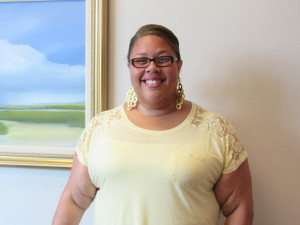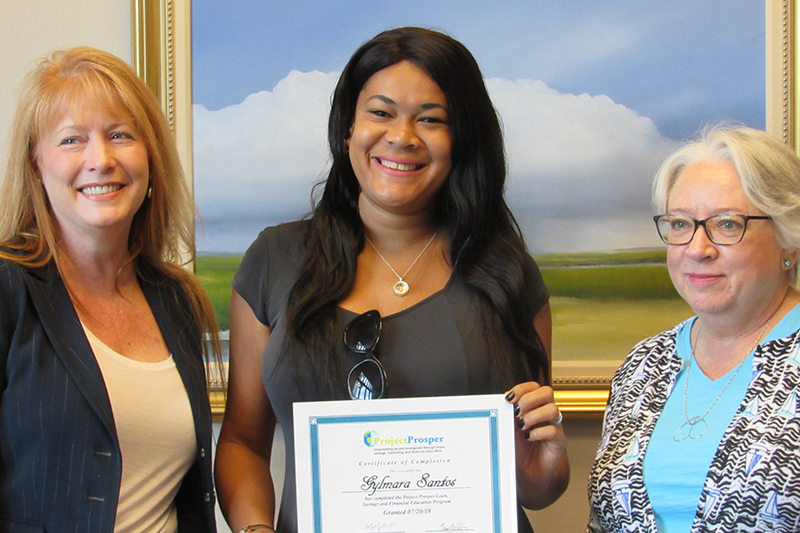L-R, Kristin Smith, Gylmara Santos, and Nancy McCarthy
By J.A. Jones, Staff Writer
ST. PETERSBURG – On a muggy Friday at the end of July, Maxi Wood, programs manager of Project Prosper, met recent immigrant Brazilian-born Gylmara Santos, owner of a house cleaning and organizing service, to bring to a close a two-year process.
Meeting at Raymond James, Santos was accompanied by her husband, Kristin Smith, Project Prosper loan committee chair and Nancy McCarthy, a long-time Project Prosper loan program mentor.
The group gathered to have all parties sign on the dotted line that Santos had finished paying the micro-loan she received from Project Prosper to help her start her maid service and to give her the pleasant reimbursement check of $300 she earned from making all her payments.
In the two years since she first met Wood, with the help of the bike, which the loan enabled her to purchase, Santos’ business grew from three clients to more than 25.

Maxi Wood, Program Manager of Project Prosper
“I’m very happy,” the Project Prosper graduate beamed. “My clients are wonderful; I work two or three days a week, very hard days, but so nice because it’s like I’m not working. I make nice money and have a lot of fun,” she added.
Project Prosper’s mission is “to provide financial integration services and resources that empower recent immigrants and refugees in our community to achieve financial stability.”
Founded in 2007, Project Prosper was the brainchild of Robin Warren and Ann Haendal, two women with a heart for immigrants and refugees. The organization offers two programs: Financial Literacy and their Loan Program.
Wood has been the Programs Manager for the last eight years. “Ann was a world traveler who had seen micro-lending work in third world countries. She said, ‘We can do that here in St Petersburg,’” Wood explained.
Robin Warren was an attorney who saw the importance of financially educating immigrants and how easily they were taken advantage of. The two met, married their ideas and birthed Project Prosper.
Since 2007, through their Loan Program, Project Prosper has made 72 micro-loans, with a maximum of $1,500.00 per loan. Loans can be used to cover expenses such as permanent residency costs, small business supplies, education costs, or in Santos’ case, a bicycle for travel.
Recently, Project Prosper added reporting loan payments to financial institutions, which often gives loanees their first credit histories.
Students come from all over South America, Africa, Asia, Eastern Europe and the Middle East, and most are between 21 to 64 years of age. The majority make less than $25,000 per year, with more than 50 percent making under $15,000 annually.
The winner of the 2017 WEDU Be More Encouraged (Judge’s Choice) Award, Project Prosper holds their classes onsite at the locations they partner with, enabling students to receive the free training without having to add yet another travel obligation to their already hectic lives.
“It takes an organization like ours to come to where they already are, so they don’t have to go someplace else, or to something else to learn about how the financial system works in this country,” stated Wood, who noted that often, like many native-born Americans, immigrants must work two or even three jobs.
Project Prosper’s Financial Literacy program takes place at schools and centers teaching English language learners in ESOL (English for Speakers of Other Languages) classes, including Pinellas County schools such as Tomlinson Adult Learning Center and Dixie Hollins Adult Education Center. Volunteers teach a modified Wells Fargo curriculum.
Classes include three core modules: Financial Institutions 101, Budgeting Basics and Understanding Credit Cards, and nine electives that the learning program or school can choose, such as Checking and Savings, Basics of Car Buying or Home Buying 101.
While Wood is the organization’s sole full-time employee, she has a part-time assistant and says she couldn’t do it without the more than 100 active volunteers. The volunteers are experts or instructors in the financial field; many come from banking institutions. Wood says they always need more volunteers.
There’s also a very active board of trustees who are often in the classrooms alongside the volunteer instructors – including, this year, a first-generation immigrant from India and another from Cuba.
Wood describes herself as having a heart for immigrants and refugees.
“I know what it’s like to move someplace where you know no one, and you need that guidance and that help,” she shared.
Ten years of volunteering as an ESOL instructor prepared her to work at Project Prosper, where she was hired as the very first employee in a part-time position in 2010.
Today, Wood is proud and thrilled at the organization’s growth; although, she admits new immigration policies are definitely impacting students.
“It really depends on how they came to the country,” she acknowledged. “For example, the Haitian entrance — now being told that they have to leave and don’t have permanent residency. So, if they’re in the classroom and the word has come down that they have to go, of course, there’s that anxiety,” she asserted.
Wood also noted that while in 2016, Tampa Bay received 60,000 refugees, she doubted they would see numbers anywhere close to that this year.
But while the schools are dealing with the impact of the new laws, at Project Prosper they’re less likely to experience student stress.
“We are really just coming in to provide the much-needed information,” said Wood. “And a lot of them are so excited to see us.”
For more information on Project Prosper, or to find out how to volunteer, visit www.projectprosper.org.
To reach J.A. Jones, email jjones@theweeklychallenger.com.
Post Views:
2,485
